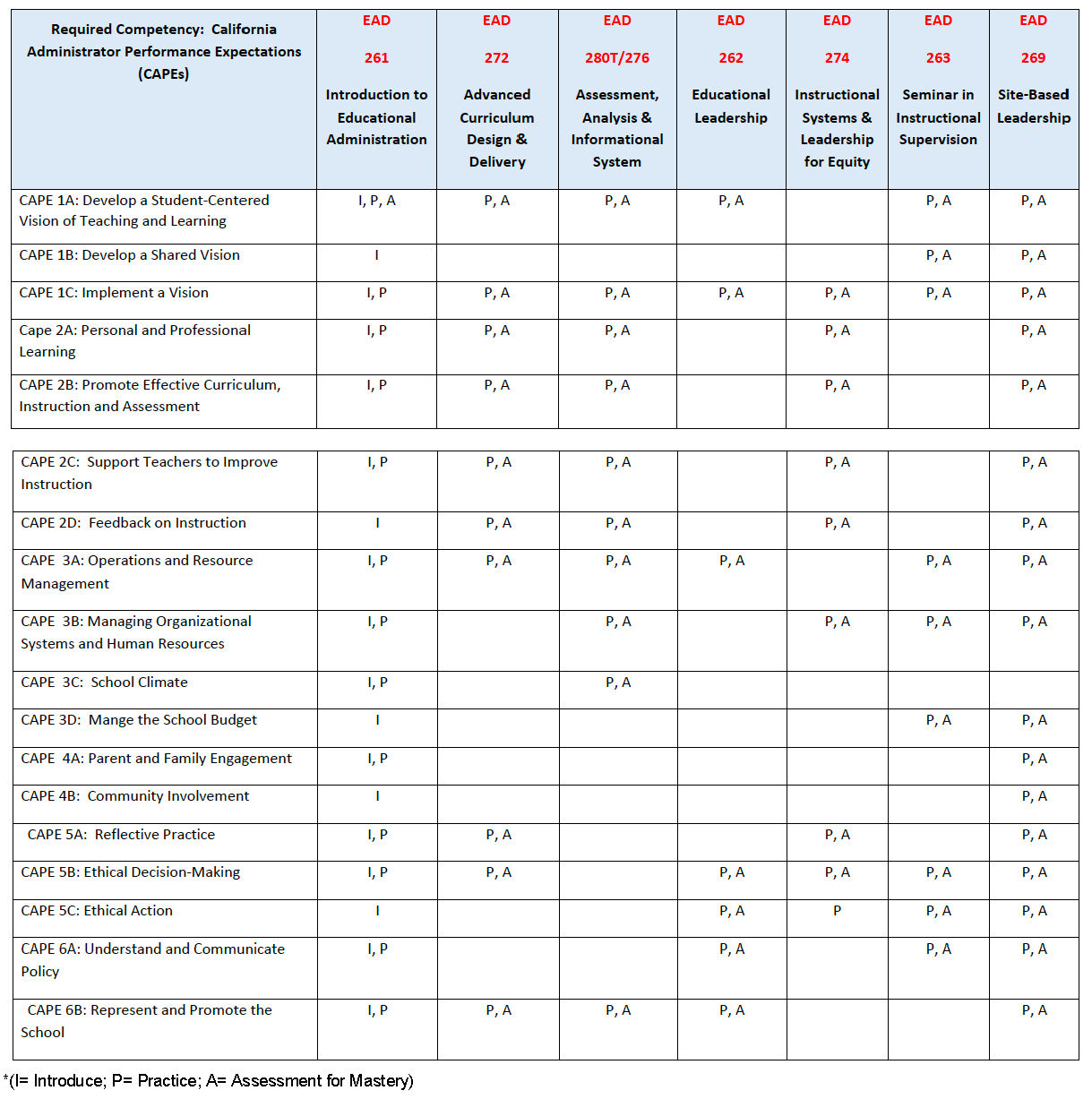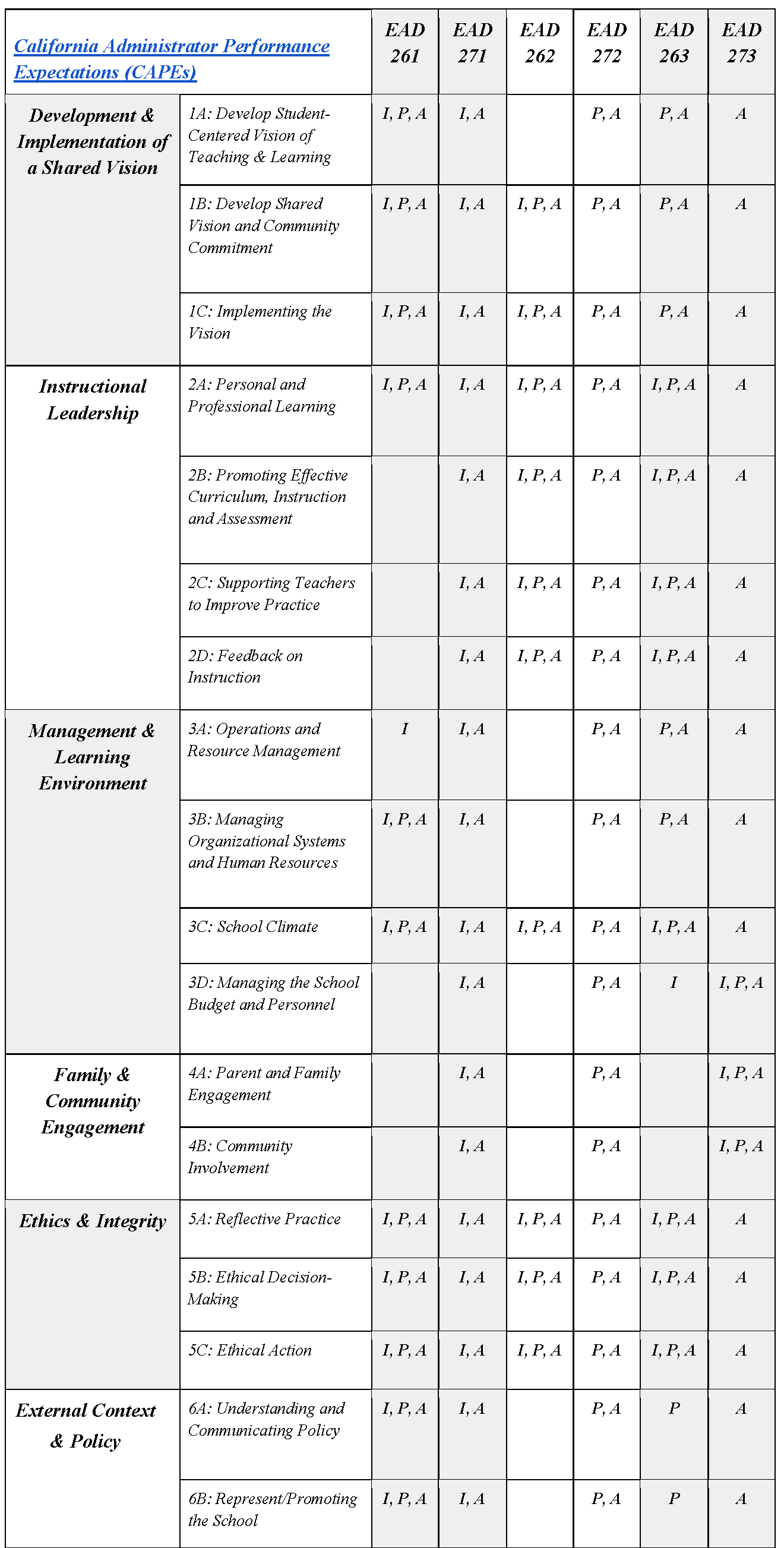AAQEP Accreditation
Standard 3 Aspect A
Standard 3: Evidence, including documentation of program practices and resources as well as the program’s rationale for its structure and operation, shows the program,
3a. Offers coherent curricula with clear expectations that are aligned with state and national standards, as applicable.
The Preliminary Administrative Services Credential program is aligned with the California Commission on Teacher Credentialing (CTC) California Administrator Performance Expectations (CAPEs). Candidates attainment is measured using the California Administrator Preparation Assessment (CalAPA) along with the successful completion of the PASC program with clinical fieldwork experience embedded through the course content.
The Fresno State Preliminary Administrative Services Credential Program and Master of Arts Degree in Educational Leadership and Administration (FS PASC/MAED) prepares highly qualified aspiring school administrators through coursework and embedded fieldwork experiences aligned to the requirements, standards, and expectations set forth by the CTC. This 3-semester sequential progression model includes high expectations, mastery learning, and cohorts of individuals currently employed in the educational setting. Candidates are expected to apply: theoretical and scholarly concepts, knowledge, and leadership skills in leading schools and school districts.
The mission of the FS PASC/MAED is to prepare credible and relevant leaders in education committed to advancing equity and excellence throughout the Central Valley. The program is rigorous, application-oriented, and focused on common goals in order to prepare knowledgeable practitioners. Candidates are offered the opportunity to remain working full-time in the field of education while taking courses in the evenings and in a blended or hybrid learning environment with some online coursework available. As part of our redesign efforts, FS PASC is working to gain University approvals required to offer a fully online cohort model to meet the needs in outlying rural and mountain school districts. Candidates can complete the program in three semesters where courses have been developed to include specific CTC program standards and then correspond with a designated learning cycle in the new California Administrator Performance Assessment (CalAPA). Each semester students may be enrolled in 3-4 courses based on credential only or MAED pathway plus credential. The coursework required for the credential is 24 units. For those candidates working towards the master’s degree, two courses (ERE 153, ERE 220/244) are offered online and the culminating experience is an online or independent project experience with a faculty advisor: Master’s Project (EAD 298) or Thesis (EAD 299). While courses are offered in a face-to-face delivery model, some sessions may be delivered online.
For our sunsetting model, each Educational Leadership (EAD) course is offered in a seven-session format in the evenings in a blended or hybrid model, Semester 1 has an emphasis in Instructional Leadership and the Development and Implementation of Shared Vision-Leadership-CalAPA, Cycle 2. Semester 2 has a focus on Leadership Cycle 1, the Management and Learning Environment with the inclusion of Ethics and Integrity of school leadership. Lastly, Semester 3 focuses on Leadership Cycle 3 and the skill needed to attend to the Management and Learning Environment with an Instructional Leadership focus (See Table 1 below).
For our newly redesigned program, courses have been consolidated into a semester-long format with heavier unit load along with the addition of a virtual Leadership Seminar and Fieldwork support course (See Table 2 below). This will allow for more continuity for content learning and skills practice without switching professors every 7-weeks as is usually the case in our sunsetting model. Furthermore, more intentional support for the CalAPA can be provided in the seminar courses which releases that focus from the core classes. Lastly, the redesigned model now follows the CalAPA CAPEs content by numerical order: Semester 1 (CalAPA 1), Semester 2 (CalAPA 2), Semester 3 (CalAPA 3). The goal is to provide more clarity to the program sequencing and to honor the content and competencies required by respective CalAPA to better align with the current semester skills and ability of our candidates.
Fieldwork experiences are embedded in EAD courses and include learning experiences
in a diverse school setting. Each candidate identifies a Field Mentor who is confirmed
to meet the CTC criteria by the program coordinator with the partnership district.
For our sunsetting model, Tenure track faculty oversee the fieldwork experiences
as the university coach through competency tasks that are used to measure student
learning. Common rubrics and scoring guides are used throughout the program for common
competency tasks in each cohort. Fieldwork experiences and competency tasks are based
on standards required by the CTC and aligned to the CAPEs and CalAPA, as appropriate.
Candidates are expected to apply theoretical and scholarly concepts, knowledge, and
leadership skills through the competency tasks and CalAPA experiences engaged in
each semester. Evidence of field mentor interactions are documented by the candidate
and submitted to the Coordinator on a semester basis through a reflective log.
Each semester, candidates engage in field experience learning activities that are embedded in: EAD 261, EAD 280T/EAD 276, EAD 262, EAD 263, EAD 274, and EAD 269 totaling approximately 100 hours. Candidates are expected to complete fieldwork assignments at both a primary Preschool-6th grade site and secondary 7-12th grade.
For our redesigned program, candidates will continue to participate in courses embedded fieldwork experiences; however, the candidates will also be enrolled in a leadership seminar and fieldwork course where they regularly connect with their seminar instructor as the university coach regarding fieldwork reflection and support. This course will also include the paperwork required by the CTC to document and reflect on all fieldwork experiences and site-based mentor interactions to ensure all CAPEs are experienced across diverse contexts.
The program also offers an internship option as part of the integrated cohort model. All cohorts are in partnership with local school districts throughout the Central Valley. Internship candidates complete the same courses as others; however, they also complete EAD 287 (Internship I)/EAD 288 (Internship II) based on entry date as an intern candidate. During any given year school year, the FS PASC/MAED operates between three to five cohorts in local districts and on campus.
Tables to indicate alignment between curricula and/or national standards:
(Tables as submitted for CCTC Program Standards review)
Table 1
Sunsetting FS PASC Course and CAPEs alignment matrix 
Table 2
Redesigned FS PASC Course and CAPEs alignment matrix